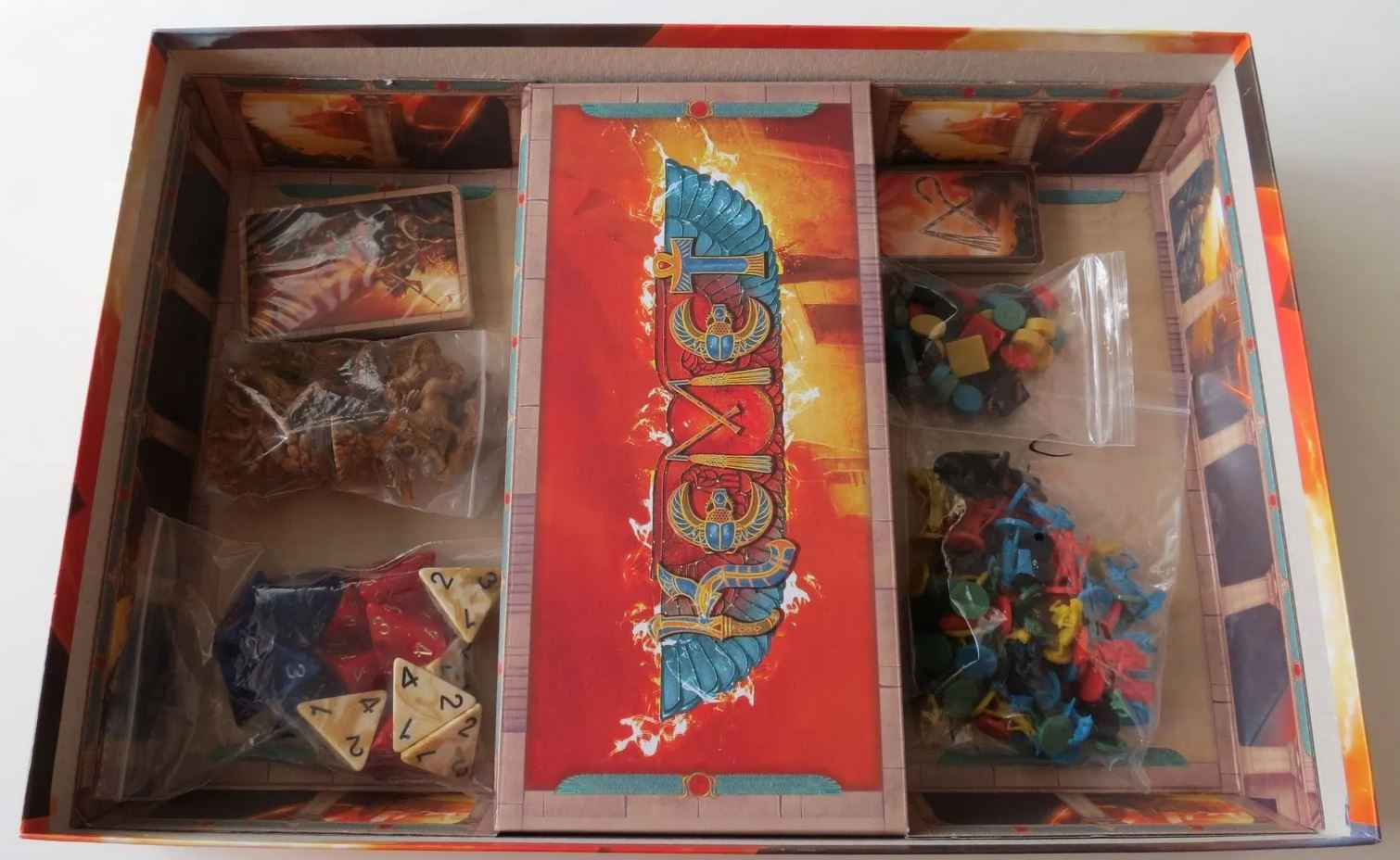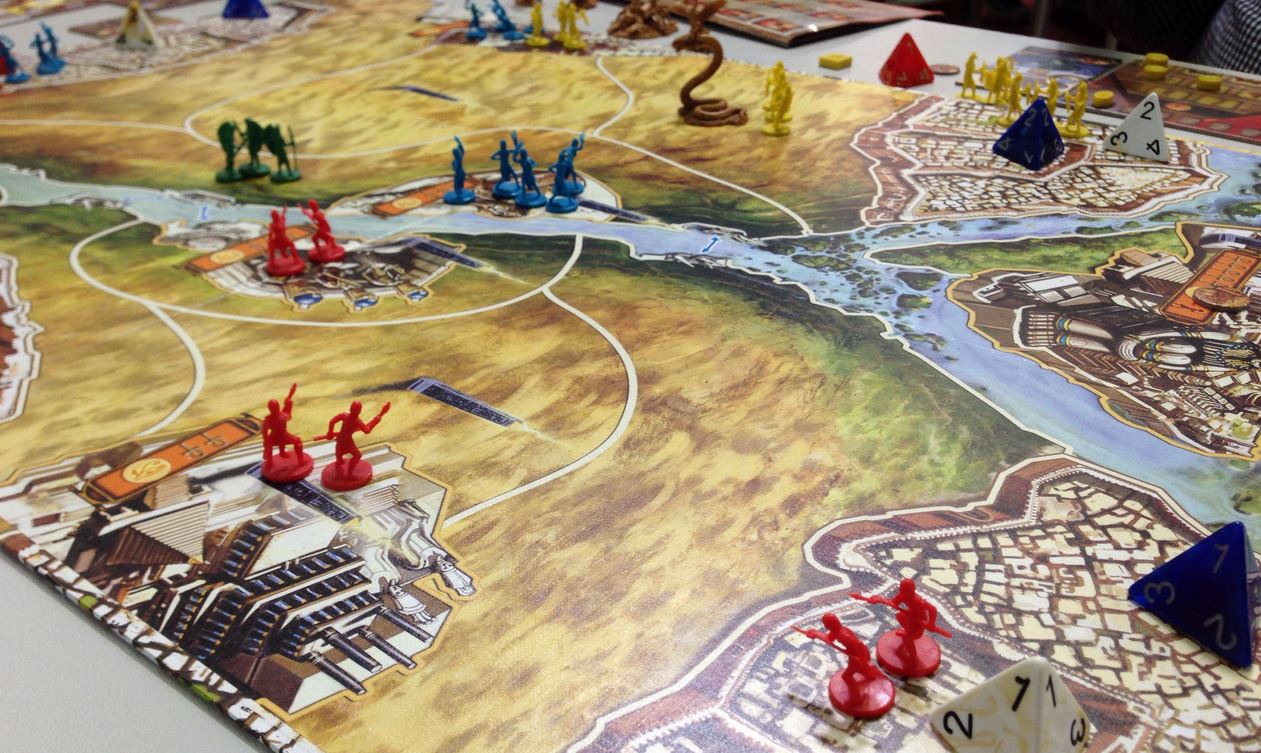In the mystical realm of Kemet, ancient gods, and divine beings reign supreme, and epic battles of godlike proportions unfold on the sacred sands of an otherworldly desert. Armies of fantastical creatures, led by immortal pharaohs, clash beneath the blazing sun, seeking to claim the mystical powers of the land.
As players step into the sandals of godlike leaders, they command legions of mythical creatures, invoke divine powers, and engage in fierce conflicts to dominate Kemet.
Amidst the pyramids and temples, they weave a tapestry of war, strategy, and divine ascension, with each decision echoing through the annals of history. In Kemet, the line between mortals and gods blurs, and only the most cunning and fearless shall carve their legend into the sands of time.
What’s included in Kemet?

- Game Board: The board represents the mythical land of Kemet, divided into regions with various attributes.
- Player Tokens: Each player has a color-coded set of tokens representing their armies, pyramids, and controlled temples.
- Creature Tokens: Tokens representing mythical creatures that can join your armies.
- Power Tiles: Cards that grant special abilities and divine powers to your armies.
- Battle Cards: Cards that enhance your armies during combat.
- Action Tokens: Used to perform actions during a player’s turn.
- Victory Points and Prayer Points: Track your victory points and prayer points on the score track.
- Player Aids: Reference sheets with important information.
How to play Kemet

Setup
- Place the game board in the center of the table.
- Each player chooses a color and takes the corresponding tokens, including 3 pyramids and 9 units.
- Place the creature tokens, Power tiles, and Battle cards nearby.
- Shuffle the Divine Intervention cards and place them face-down.
- Give each player a Player Aid and 5 Action tokens.
- Set the Victory Point track to 0 for all players.
- Randomly select a starting player.
Rules for Kemet
The game is played over a series of rounds, with each round consisting of four phases: Dawn, Day, Dusk, and Night.
- Dawn Phase:
- Players regain Action tokens, deploy their creatures, and reset their Prayer points to 0.
- Players can also buy Power tiles if they control a temple with a Power tile market.
- Day Phase:
- Players take turns, starting with the first player, and perform one action per turn.
- Actions include moving armies, attacking, recruiting creatures, upgrading pyramids, controlling temples, and more. You spend Action tokens to perform these actions.
- Dusk Phase:
- At the end of the Day Phase, players can score Victory Points for controlling temples and obelisks.
- Players can also purchase Power tiles with their Prayer points.
- Then, players check for Divine Intervention.
- Night Phase:
- Divine Intervention cards are drawn and resolved. These can be events, powers, or permanent upgrades.
Victory Conditions: Players earn Victory Points for various actions and control of specific regions. The game ends when a player reaches a certain Victory Point threshold (determined by the number of players), or when a player reaches 10 Victory Points and declares a decisive victory.
For the official rules, see the link below:
How to win Kemet
Choose a Cohesive Strategy:
- At the beginning of the game, decide on a clear strategy and stick to it. Kemet offers various paths to victory, including military conquest, temple control, and powerful Power tiles. Your strategy should align with your chosen path.
2. Prioritize Pyramids and Upgrades:
- Upgrading your pyramids unlocks powerful abilities and gives you an advantage. Consider focusing on one or two specific colors of pyramids to maximize their benefits. The ability to move armies quickly, teleport between temples, or recruit strong creatures can be game-changing.
3. Aggressive Expansion:
- Kemet is a game of aggressive expansion. Don’t be afraid to engage in combat and conquer regions controlled by other players. Winning battles not only earns you Victory Points but also allows you to eliminate an opponent’s units from the game.
4. Power Tiles and Prayer Points:
- Acquire Power tiles that complement your strategy. Look for tiles that enhance your combat strength, offer unique abilities, or provide defensive advantages. Use your Prayer points to buy these tiles.
- Keep in mind that some Power tiles can be game-changers, so timing your acquisitions for maximum impact is crucial.
5. Temples and Victory Points:
- Controlling temples is essential for earning Victory Points and obtaining Power tiles. Focus on controlling key temples early in the game, as this provides a steady stream of Prayer points.
- Be aware of the Victory Point conditions. Plan to control regions and temples that grant Victory Points during the Dusk Phase. These points can accumulate quickly, especially in larger player counts.
6. Strategic Alliances:
- Form temporary alliances with other players to achieve your goals. You can coordinate attacks against a common enemy or share information about opponents’ strategies. However, remember that only one player can win, so be ready to turn on your allies when the time is right.
7. Divine Intervention Cards:
- Divine Intervention cards can be unpredictable. Be prepared for various outcomes, and strategize around the potential events. Some cards can offer unique advantages, while others can disrupt your plans.
8. Combat Tactics:
- In combat, choose your battles wisely. Consider factors such as your opponents’ army sizes, available Battle cards, and the region’s defensive bonuses before attacking.
- Timing can be crucial in combat. Surprise your opponents by attacking when they least expect it, or use diplomacy to manipulate their actions before engaging in battle.
9. Balance Expansion and Defense:
- While expanding your territory is essential, maintaining a strong defensive presence is equally important. Leaving your regions vulnerable to counterattacks can be costly. Use fortifications and defensive Power tiles to protect your key positions.
10. Adapt to Opponents:
- Pay attention to your opponents’ strategies and adapt accordingly. If someone is focusing on a specific Victory Point condition, try to contest it or pivot to a different approach to gain an advantage.